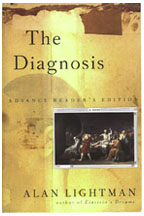|
Web Exclusives: Features November 8, 2000: Anti-modern age
A man who thinks that technology is often abused would much prefer that an interview with him appear on the printed page, especially since it is largely focused on his new novel, The Diagnosis. Ironically, the novel's focus is on a man whose life is spent commuting, talking on cell phones, working at computers, and sending e-mails and who becomes ill with a debilitating disease that never gets fully diagnosed. One of the disease's most profound symptoms is a pervasive numbness. "My original idea was to do a part comic, part tragic satire of modern life and modern consciousness," Lightman said. "To show the way we're drowning in our own prosperity." Nothing in particular set him to thinking about this, he said, but he added, "I'm just very much aware of how little time we have for personal reflection. How few silences there are in modern life. The fact that we seem to have lost our way as a country. I think we're still a moral country, but I think we've lost our sense of values. The frantic pace of modern life is just a symptom of a deeper loss of centeredness. "In my novel, I wanted to give my main character a tiny ray of awareness and then follow-up with him. I think one of the aspects of our national malaise is numbness." Lightman, who does not use either a cell phone or email but does work on a laptop, hopes to change people's thinking. "I want this book to impact how people in this country feel about their lives," he said. "We're oblivious to the way our notion of relationships have been altered by high-speed communication." Because of the nature of his work, Lightman is able to retreat from modern life during the summers, when he withdraws to a remote island off the coast of Maine where there are no telephones. He acknowledges that he's privileged to be able to take three months off. "It's really hard to disconnect, even when you are aware of this madness," he said. His family, his wife and two daughters, don't take such a hard stand on technology. "My wife has a cell phone, and my younger daughter is on the Internet all the time. My wife agrees with me, but we do have some vigorous discussion about this. She's not as willing to unplug as I am." In The Diagnosis, which was nominated for a National Book Award last month, the main character, because of his disease, becomes more and more disconnected with his wife and son and eventually retreats into himself totally, becoming essentially nothing much more than a husk of person. He's lost all contact with friends, family, and colleagues. "The deeper issue, which I try to get at in my book, is that we've lost our sense of priorities, our values, what's important to us, we're rushing from one thing to the next, without realizing what's important to us," Lightman says. "Thoreau said that for each thing we do, and I think he was speaking of technological things, we have to figure out the true cost of the thing. And by true cost, he meant the amount of life that had to be traded for it. We're not aware how the quality of our lives have been profoundly affected by the technology we use." The Diagnosis was a difficult book to write. The idea for it had been cooking for six to eight years, but Lightman didn't start writing until after he published his second book of fiction, Good Benito, in 1995. After three years of working on The Diagnosis, he was afraid he wouldn't finish it, but with feedback from his editor, his wife, and his high school English teacher, he was able to turn the final corner. Lightman hasn't always been a writer and social critic. After he earned a Ph.D. in physics in 1974, he spent the next 15 years as a professor and scientist. During that time, he began publishing essays about science. In 1989 he was hired by M.I.T., where he was a professor of science and writing and a senior lecturer in physics. In 1993, he stopped teaching physics. "I found I didn't have time to do all the things I wanted to do. I had to make choices. I stopped doing research in physics about the same time. That was a painful choice." Next year, he will teach fiction writing and science writing. He's published nine books and numerous essays. By Lolly O'Brien
|

 Alan
Lightman '70 must have swallowed hard when he realized that this
profile of him was going to appear solely online at PAW's Web site.
Alan
Lightman '70 must have swallowed hard when he realized that this
profile of him was going to appear solely online at PAW's Web site.